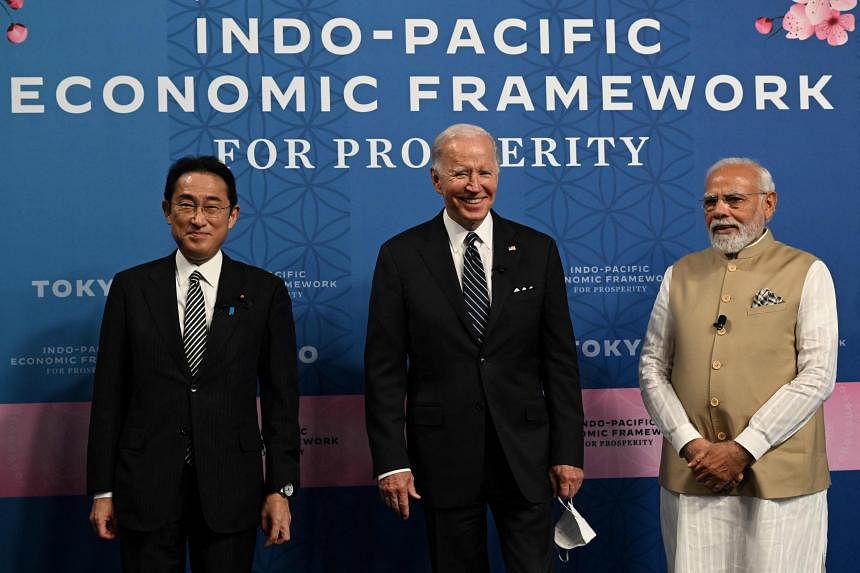SINGAPORE - Japanese Prime Minister Fumio Kishida arrived in Singapore on Friday evening (June 10) to deliver the keynote address at the three-day Shangri-La Dialogue.
Here is an excerpt of an e-mail interview from Tokyo where he shares his views on bilateral and regional issues.
Q: Singapore has expressed keen interest in increasing cooperation with Japan in a number of areas, including digital economy, green economy, smart cities, civil aviation and air rights. Are there specific projects or targets to move ahead in these areas? Are you also interested in updating the 20-year-old Japan-Singapore Economic Partnership Agreement?
A: I am pleased to witness how the cooperation between Japan and Singapore is further deepened and expanded through Prime Minister Lee Hsien Loong's recent visit to Japan, and my own visit to Singapore this time.
There are concrete projects under way between our two countries, particularly in the digital and start-up sectors. During Prime Minister Lee's recent visit to Japan, we succeeded in launching the public-private dialogue with the view to crystallising the Asia-Japan Investing for the Future Initiative (AJIF).
We also signed two memorandums of cooperation (between Singapore's GovTech and Japan's Digital Agency, on digital government transformation; and between Enterprise Singapore and Japan External Trade Organization on start-up and innovation cooperation).
In the future, we would like to forge concrete cooperation in innovative fields. Specifically in the digital field, we would like to deepen cooperation through expert meetings between the two countries, bearing in mind the linkage between Japan's Digital Garden City initiative and Singapore's Smart Nation initiative.
In addition, under my Asia Zero Emissions Community vision, we would like to work together in finance and other areas to support energy transitions in accordance with each country's circumstances.
The Japan-Singapore Economic Partnership Agreement (JSEPA) was the first bilateral economic partnership agreement concluded by Japan, and has contributed to the expansion of bilateral economic relations.
From the perspective of strengthening regional economic relations and improving the business environment, it is vital that both Japan and Singapore take the leading role in areas such as free trade, digital, climate change and the revitalisation of people-to-people exchanges.
On top of that, from the perspective of building a free and fair economic area in the region, we would like to maintain and strengthen the international order, as well as deepen our cooperation in achieving our common interests.
To this end, we intend to work together towards maintaining high standards of the Comprehensive and Progressive Agreement for the Trans-Pacific Partnership and ensuring the full implementation of the Regional Comprehensive Economic Partnership agreement.
Q: As you are aware, Prime Minister, Japan is a much loved destination for travellers from Singapore. Would you share more on Japan's reopening plans that Singaporeans can look forward to?
A: We are very much pleased that Japan is loved by the people of Singapore as a travel destination.
While the strengthening of Japan's border control measures was necessary to secure the medical system and to make time for vaccine roll-outs, we have decided to further relax our border control measures in the coming days.
From June 1, we have implemented steps to ensure smooth entry, expanding the total number of people entering the country from around 10,000 to 20,000 per day, while taking necessary quarantine measures corresponding to the risk of inflow.
These steps include the lifting of on-arrival test and waiting procedures for those entering from low-risk countries and regions, including Singapore. From June 10, we start accepting tourists on escorted packaged tours from low-risk countries and regions, including Singapore. I hope that our friends in Singapore can enjoy their stay in Japan.
We will continue to strive towards expanding the numbers in phases, while monitoring the infection situation.
Q: At the same time, statistics seem to suggest that fewer Japanese own passports and apparently do not care to travel the world or study abroad. How do you regard this trend?
A: The number of Japanese passport holders decreased from 30.27 million at the end of 2019 to approximately 24.40 million at the end of 2021. This is presumably due to the significant decline in international travellers, including business travellers, and international students, especially from March 2020, with the global spread of Covid-19.
The number of passports issued has shown signs of recovery since March this year.
Q: In your speech in Tokyo on May 26, you raised the need for a "new international order originating from Asia". What are the key elements of such an international order, and how will Japan work to forge this new order? What would the conception of Asean and of Asian heavyweights China and India be within such an order, and will it ensure that South-east Asia does not have to choose between the US and China?
A: In building a new international order originating from Asia, I think the Indo-Pacific should be a free and open region, a sustainable and robustly growing region, and a region that contributes to resolving global challenges.
In particular, in order to safeguard peaceful order and to achieve sustainable prosperity in the region, the fundamental principle that "no violation of sovereignty or territorial integrity or unilateral change of status quo by force shall be permitted in any region" must be observed.
This is not a matter of "choosing which country"; it is a question of how to build a free and open order based on rule of law, not by force.
Japan is determined to fulfil its role and responsibility by actively contributing to the forming of the future of the region together with its partners, including Singapore.
When I think about the future of Asia, I place particular emphasis on the relationship with Asean, including Singapore, and the centrality and the unity of Asean.
The Asean Outlook on the Indo-Pacific (AOIP), presented by Asean itself, embodies many principles in common with the idea of the Free and Open Indo-Pacific (FOIP). Japan intends to cooperate towards the realisation of FOIP and AOIP in a concrete way.
It is important that China, the world's second-largest economy, fulfils its responsibility as a major power in accordance with the rules of the international community. We will continue to say what we need to say to China, and ask China to act responsibly.
In relation to India, as like-minded countries sharing fundamental values, we are promoting concrete cooperation in a wide range of fields, through bilateral, as well as Japan-US-Australia-India initiatives, towards the realisation of our common vision of FOIP.
Q: Japan and Asean will soon mark 50 years of friendly ties. Could you share your thoughts on how the relations can be made stronger, especially in view of supply chain disruptions caused by the war in Ukraine and recession clouds thought to be looming on the horizon.
A: Russia's invasion of Ukraine is an act that jeopardises the foundation of international order, including in Asia. Such a unilateral attempt to change the status quo by force is unacceptable anywhere in the world.
Russia's invasion has also disrupted global energy and food supplies, and has brought to the surface economic problems that are not confined to the countries and regions concerned. Japan intends to coordinate with Asean countries in tackling these challenges.
Since commencing dialogue in 1973, Japan and Asean have overcome various difficulties together and have built a close cooperative relationship towards the development and prosperity of the region.
Next year marks the 50th anniversary of friendship and cooperation between Japan and Asean. On this historic occasion, we plan to welcome the leaders of Asean countries to Japan for a special summit meeting to review our relations over the past half century and look to the future, setting out a new direction in our relations and a vision for cooperation between Japan and Asean.
A multitude of cooperation is already under way between Japan and Asean. Cooperation on the AOIP is expected to be an important element. We look forward to working, on a continuous basis, with Singapore and other countries on AOIP's key areas, such as maritime cooperation, connectivity, sustainable development goals and the economy.


